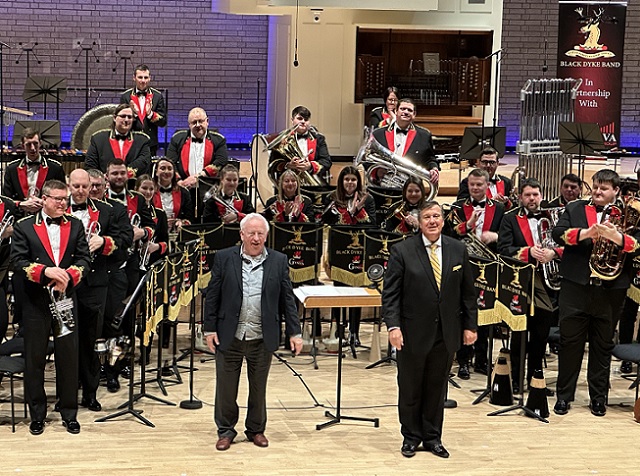

A bold confidence permeated Black Dyke’s festival appearance; the musical certainties led by MD Prof Nicholas Childs delivered on a polished range of repertoire of unexpected twists and turns.
Spirit gondolier
Judith Bingham’s ‘Venice’ euphonium concerto certainly eschewed expectations in using the soloist as a loquacious ‘spirit gondolier’ revealing the truths behind the established myths, political intrigues and musical fame of the iconic city.
Where listeners were poised for virtuosic snapshots of Casanova, the Doge’s Palace and Vivaldi’s ‘Four Seasons’, instead they were led through canals of fetid mists, dark conspiracies and the crudities of character Commedia dell’Arte.
Daniel Thomas delivered his melodic tale with persuasive, cultured malevolence – like Charon taking unwary tourists across the River Styx on payment of the composer’s 13th century silver grosso coin.
It was a surprising journey, capturing the underbelly of Venetian life in its true colours – and one well worth taking again.
Daniel Thomas delivered his melodic tale with persuasive, cultured malevolence – like Charon taking unwary tourists across the River Styx on payment of the composer’s 13th century silver grosso coin.
Fearless heroines
The fearless heroines of land, sea and air were expertly brought to life by Michael Cavanagh in Peter Graham’s tribute baritone concerto, ‘Turbulence, Tide and Torque’.
So too clarity and control in defining the character portraits of Harriet Quimby, Grace Darling and Dorothy Levitt into the furthest reaches of the concert hall. It was a brilliant performance.
Edward Gregson’s ‘The World Rejoicing’ continues to engage with its mature appreciation of variant form. Prof Childs also took the opportunity to explore its intricacies, drawing out its quotes, nuances and detours without losing the flow and purpose of its joyful spirit.
Elsewhere their ‘Hymn for Bram’ tribute was realised by a sympathetically amended central section of Peter Graham’s ‘Metropolis 1927’, whilst the concert opening ‘Music from the Elizabethan Court’ was a stylish reminder of Elgar Howarth’s arranging command of renaissance form and function. The energetic rush of Fredrick Schjelderup’s ‘Out of Reach’ acted as sugary aperitif to open the second half.
Philip Wilby’s wonderful introduction (even making an apology for Ludwig’s enforced absence) set the scene for a work he described as something of a theatrical ‘high tea’ of variant sandwich fillings based on the essential ingredient of the famous choral finish to the ‘9th Symphony’.
Ode to Joy
The finale came with ‘Beethoven’ – 11 minutes or so of ‘Ode to Joy’ choreographed celebratory wit.
Philip Wilby’s wonderful introduction (even making an apology for Ludwig’s enforced absence) set the scene for a work he described as something of a theatrical ‘high tea’ of variant sandwich fillings based on the essential ingredient of the famous choral finish to the ‘9th Symphony’.
Some tart, others tasty, the odd amuse-bouche (three side drum soloists at one point) mixed in with a hefty bap or two - but all leading to a mouthful of a familiar creamy favourite to close.
It was delivered with just the right nod of seriously tasteful appreciation, as was the MDs ‘tap of the watch’ insistence of leaving the stage without an encore at its close.
That was also a little unexpected – but it was certainly in keeping with the musical outlook of the evening.
Iwan Fox









